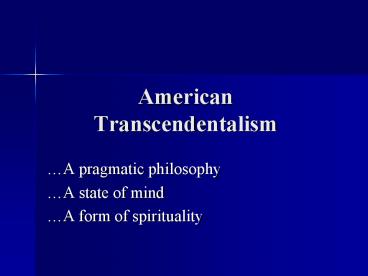American Transcendentalism - PowerPoint PPT Presentation
1 / 8
Title:
American Transcendentalism
Description:
The individual is the spiritual center of the universe ... Romanticism. Fundamental Beliefs. Transcendentalism rises about the animalistic impulses of life ... – PowerPoint PPT presentation
Number of Views:958
Avg rating:3.0/5.0
Title: American Transcendentalism
1
American Transcendentalism
- A pragmatic philosophy
- A state of mind
- A form of spirituality
2
Basic Assumptions
- The individual is the spiritual center of the
universe - An understanding of nature, history and God can
be found in the individual - All knowledge begins with self knowledge
3
Basic Assumptions
- Nature is a living mystery, filled with symbolism
- Individual happiness depends on self-realization
- To know and become one with the world and nature
- To remain unique and separate
4
Fundamental Beliefs
- Transcendentalism is a form of idealism
- Transcendentalism was influenced by
- Puritanism
- Quaker beliefs
- Unitarianism
- Romanticism
5
Fundamental Beliefs
- Transcendentalism rises about the animalistic
impulses of life - Transcendentalism moves from the rational to the
spiritual realm - The individual human soul is part of the Divine
Soul or Oversoul - Every individual is part of the Oversoul
6
Fundamental Beliefs
- The Oversoul is interchangeable with God
- God is found in nature and in human nature
- Life is more important than afterlife
- Death is not feared the soul passes to the
Oversoul in death
7
Fundamental Beliefs
- Evil is merely the absence of good
- Good is much more powerful than evil
- Power is obtained through self-reliance
- Consistency is not valued
- There is a unity between all things in the
universe - True reform comes from within
8
Influences of Transcendentalism
- Plato introduced idealism, which teaches that
reality exists beyond the appearances of the
world - Immanuel Kant supported the importance of the
natural spontaneity of the human mind - John Locke introduced the concept of the mind as
a tabula rasa (blank slate), and that all
knowledge develops from sensations































